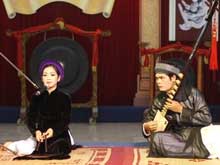Vietnam has snapped into action to protect two of its indigenous art forms after they were recently recognised by UNESCO as part of the world’s intangible cultural heritage.
 The two musical forms in question are Ca Tru (ceremonial singing) and Quan Ho Bac Ninh (Bac Ninh folk love duets).
The two musical forms in question are Ca Tru (ceremonial singing) and Quan Ho Bac Ninh (Bac Ninh folk love duets).
At a press briefing in Hanoi on October 12, the Ministry of Culture, Sports and Tourism said Ca Tru has been listed as a cultural heritage in need of urgent protection and Quan Ho Bac Ninh as an intangible cultural heritage of humanity.
Deputy Director of the Ministry’s Department of Cultural Heritage Le Thi Minh Ly said Ca Tru, which dates back to the 15th century, is listed among the intangible global cultural heritage traditions in danger of disappearing due to prolonged periods of war and inadequate awareness.
According to her, the Ministry of Culture, Sports and Tourism plans to work with relevant agencies and localities to take urgent measures from now through 2020 to protect and promote the arts.
They will systemize all related documents from 14 provinces and cities that have Ca Tru in order to build a database on the art at the Vietnam Music Institute, and to compile curricula on Ca Tru performance for training at musical schools.
The ministry also plans to translate some 4,000 pages of Chinese-transcribed Vietnamese documents on Ca Tru and publish a collection of such documents.
In addition, it will put in place preferential policies for 12 senior master artists, open training courses on Ca Tru performance in 14 localities, organise Ca Tru festivals, publish a collection and a DVD of Ca Tru songs, restore some relic sites to worship Ca Tru ancestors, and popularise the art in schools.
Quan Ho, which originated in the northern province of Bac Ninh in around the 13th century, will receive similar benefits and support.
Previously, Nha Nhac Hue (royal court music) of the Nguyen Dynasty and the Area of Cong Chieng (gongs) Culture in the Central Highlands of Tay Nguyen were also recognised by the UNESCO as part of the World’s Intangible Cultural Heritage.